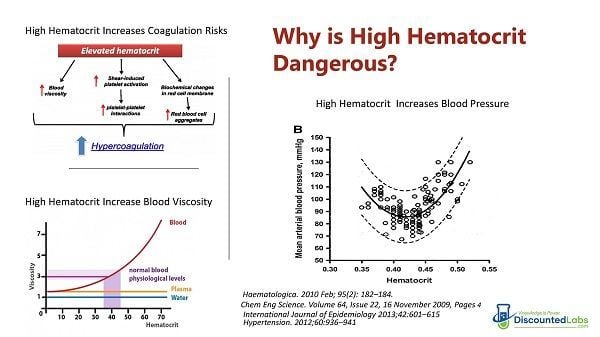Hi Guys
Blood lab turned me away for having Haemoglobin of 198. Apparently the limit is 185(Here in New Zealand)
I am currently on 80mg(split twice a week 40+40)of test cyp deep IM. Have been on this for 4 months and going well. Can't do and form of subq as gives me anxiety insomnia and gummyworm dick.
Should I lower my dose?
Latest labs below
Thanks
Prolactin 489mU/L(65-400)(taking cabergoline quarter of a 0.5mg tablet per week)
Total testosterone 22nmol/L(8.6-29)
Free testosterone 667pmol/L(220-680)
SHBG 17pmol/L(13-49)
Estradiol 143pmol/L(0-190)
Ferritin 46ug/L(30-500)
PVC 0.55 L/L(0.40-0 54)
Haemoglobin 184 g/L(125-170)
RBC 6.2x10'12/L(4.0-5.8)
____________________________________

The New Zealand Blood Service (NZBS) explicitly says that erythrocytosis caused by testosterone-replacement therapy (TRT) is not an accepted indication for its therapeutic venesection (phlebotomy) programme. In the words of the NZBS Haemochromatosis & Therapeutic Venesection Policy, section 3 (Polycythaemia / Erythrocytosis):
Blood lab turned me away for having Haemoglobin of 198. Apparently the limit is 185(Here in New Zealand)
I am currently on 80mg(split twice a week 40+40)of test cyp deep IM. Have been on this for 4 months and going well. Can't do and form of subq as gives me anxiety insomnia and gummyworm dick.
Should I lower my dose?
Latest labs below
Thanks
Prolactin 489mU/L(65-400)(taking cabergoline quarter of a 0.5mg tablet per week)
Total testosterone 22nmol/L(8.6-29)
Free testosterone 667pmol/L(220-680)
SHBG 17pmol/L(13-49)
Estradiol 143pmol/L(0-190)
Ferritin 46ug/L(30-500)
PVC 0.55 L/L(0.40-0 54)
Haemoglobin 184 g/L(125-170)
RBC 6.2x10'12/L(4.0-5.8)
____________________________________
The New Zealand Blood Service (NZBS) explicitly says that erythrocytosis caused by testosterone-replacement therapy (TRT) is not an accepted indication for its therapeutic venesection (phlebotomy) programme. In the words of the NZBS Haemochromatosis & Therapeutic Venesection Policy, section 3 (Polycythaemia / Erythrocytosis):
“Patients with high haemoglobin levels as a complication of testosterone replacement therapy do not require therapeutic venesection.” nzblood.co.nz
What that means in practice
| Topic | NZBS position |
|---|---|
| Referral to NZBS therapeutic venesection clinic | Referrals based solely on TRT-induced high Hb/Hct will be declined. NZBS regards dose adjustment, route change, or temporary cessation of testosterone as the appropriate management. |
| Alternative venues | If a man on TRT truly needs phlebotomy (e.g., very high Hct > 0.54 that cannot be controlled by modifying therapy), this must be arranged in a hospital service or privately—not through NZBS donor centres. |
| Ordinary blood donation | Men on TRT may donate blood as regular donors provided they meet all standard criteria (age, health, medications, Hb 130-185 g/L, Hct < 0.54, etc.). Donation under those rules is not considered “therapeutic” and is limited to the usual 12-week interval. |
| When NZBS does offer venesection | Accepted indications are hereditary haemochromatosis, polycythaemia rubra vera (PRV) and some other primary erythrocytoses, and porphyria cutanea tarda. Other conditions are only considered on a case-by-case basis with supporting evidence. nzblood.co.nz |
Practical takeaway for clinicians & patients on TRT
- First step is endocrine review – lowering the testosterone dose, switching from injections to transdermal formulations, or lengthening injection intervals usually resolves the elevated haematocrit.
- Reserve venesection for rare cases where haematocrit remains dangerously high despite optimising therapy and alternative causes have been excluded; organise this via hospital haematology, not NZBS.
- Do not send TRT patients to NZBS claiming “therapeutic blood donation” – the referral will be declined and valuable capacity diverted from patients with recognised indications.
Last edited:












